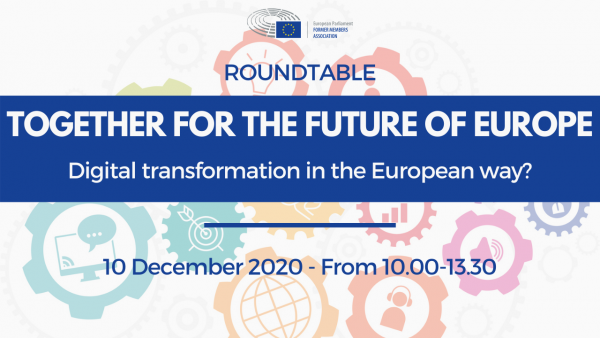Press release: for immediate release

Hans-Gert Pöttering and distinguished speakers participated in the second webinar “Together for the Future of Europe” of the European Parliament Former Members Association.
On 10 December 2020, the EP Former Members’ Association together with the Foundation for European Progressive Studies, the Wilfried Martens Centre for European Studies, the European Liberal Forum, the Green European Foundation and the European University Institute organised the online event from a series, under the topic Together for the Future of Europe inviting nine specialists and policy makers to discuss the “Digital transformation in the European way?”
Moderator, Brian McGuire, a Brussels-based journalist, specialised in European politics and business, welcomed the participants on the online platform Zoom and lead through diverse topics such as new digital ethics and human dignity, data control, security and privacy, free and independent media, fact-checking, transparency and media literacy will be discussed during the roundtable.
The first panel on Democracy and Digital Transformation was opened by the remarks of Ulises Cortés Professor of Artificial Intelligence at the University of Politècnica de Catalunya and Coordinator of the Ethics-WP in the AI4EU platform. “Digital platforms an AI applications have recently seen a traffic explosion during the pandemic and have become dominant. We have to keep in mind that they are not independent entities but almost unregulated intellectual property.”
“Technology is an outcome of human creation. How we feed technology should be guided to create a tech neutral environment by structures like the GDPR.” added Svenja Hahn MEP and Member of the Special Committee on Artificial Intelligence in a Digital Age.
Žiga Turk Professor at the University of Ljubljana, Academic Council Member, Martens Centre stated: “We have a number of European companies that market themselves as more secure and more in line with European values. We should not ban international competitors but make sure that European digital platforms that comply with the standards can compete.”
Richard Wouters thinktanker at WBGroenLinks said: “We have the rule of law to keep systems like biometric surveillance in check and are protecting fundamental rights. Personal data should not be used as a commodity a ban on the trade of personal data could be a good start ”
The second panel covered free and independent media as watchdog of democracy, fact-checking, transparency and the concentration of media ownership, media literacy and access for all. On the issue of data control, Michał Boni Former MEP, EPP Group, Senior Research Associate at the Martens Centre, urged to focus on two key elements: “who owns data and what are the regulations to sell it. This is the conversation that will follow us in the future.”
Dr. Elda Brogi, Scientific Coordinator of the Centre for Media Pluralism and Media Freedom at the European University Institute (EUI) said “we need a healthy information diet; the time is there to make this leap towards a new way of feeding democracy. In order to safeguard democracy, we have to think of new business solutions and regulatory solutions.”
“We need to support local medium sized press and find a new investment mechanism” added Maryia Sadouskaya-Komlach, team Lead Eurasia at Free Press Unlimited in the Netherlands and is a non-resident fellow of Center for European Policy Analysis.
Guillaume Klossa author of EC report “Towards European Media Sovereignty, an industrial strategy to leverage data, algorithms and artificial intelligence”, advocated the importance of the upcoming Action Plan to support recovery and transformation of the media. “The action plan will provide a transnational multilingual platform and shape regulation that insures a strong digital media single market.”
Peter Kreko director of Political Capital stated: “Disinformation is spread out by the state itself and pro governmental media. We have to let go of institutional naitivité and tackle address this issue”
To finalise all the panellist agreed that human rights and the rule of law is the essence of what it is to be European and that these ethics should be reflected in the future of a digitalized Europe. Tech morality and a European values driven digital strategy are essential in the discussion concerning digital media and data.
The event was broadcasted on Zoom and Facebook live. A large number of people participated and they animated the debate with their numerous questions.
We would like to thank all the speakers of the event for their great input to the discussion and this very successful first online webinar together.
